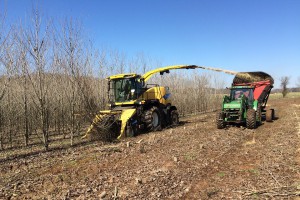
A self-propelled forage harvester with a specialized woody harvesting head harvests a 10-acre stand of hybrid poplars being studied to advance lignocellulosic biomass as part of a USDA-funded project coordinated by the University of Tennessee Center for Renewable Carbon. Photo courtesy Genera Energy Inc
University of Tennessee AgResearch Center is harvesting its first batch of popular trees to be used as biomass to create biofuels. The 10-acre plot of hybrid poplars was planted about four years ago and now the 30-foot trees are expected to produce between 60-100 tons of woody biomass. The harvest is part of a five-year $15 million multi-disciplinary research and development effort (IBSS) funded by the U.S. Department of Agriculture (USDA) to reduce barriers to the development of the Southeastern bioeconomy.
Tim Rials, director of the UT’s Center for Renewable Carbon said, “The goal of the IBSS partnership is to demonstrate the production of advanced biofuels from sustainable sources of lignocellulosic biomass, that is, biomass made from designed herbaceous and woody crops.” IBSS has focused on perennial switchgrass and short-rotation woody crops like eucalyptus, pine and hybrid poplar, trees that can be grown in the Southeast.
“It’s important for the industry and producers to have a portfolio of crops that can supply the cellulosic biomass for the biorefineries,” Rials continued. “Very little information is available on the performance of hybrid poplar in the Southeast. This project is designed to identify the effect of both genetic differences and management practices on the growth and yield of this potentially important energy crop. The data should provide the basis for future productivity improvements.”
The harvest included plots of several hybrid poplar varieties, called clones. Although genetic differences clearly impacted the overall yield, research has shown little difference in the chemical composition of the different hybrid poplar clones. “This information provides valuable guidance for continued enhancement of this new energy crop,” Rials said. Similar field trials, some with the same varieties, are also underway in Alabama, Mississippi and North Carolina to evaluate environmental impacts on biomass yield.
IBSS partner Genera Energy, a biomass supply company based in Vonore, Tenn., led the harvesting effort. The harvester utilized in the project is a standard self-propelled forage harvester with a very unique harvesting head attached to it. Only two of these woody harvesting heads exist in the world, and proving new harvesting technologies and logistics are at the core of improving the biomass supply chain for woody crops. In addition to the Knoxville harvest, Genera Energy also conducted additional harvesting of poplars in Mississippi with IBSS and Greenwood Resources.
Reducing the risk of supplying lignocellulosic feedstock and ensuring a sustainable, predictable supply of feedstocks with desirable properties for optimal performance during industrial processing is a challenge that must be confronted to make the Southeast a more attractive location for a new industry, Rials said. “The IBSS Partnership is working with that end in mind.”

